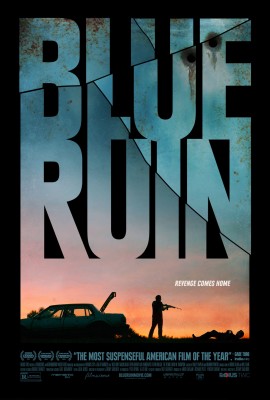Film Reviews

Blue Ruin
Genre: Thriller
Director: Jeremy Saulnier
Cast: Macon Blair, Devin Ratray, Amy Hargreaves, Eve Plumb
MPAA-Rating: R
Release Date: May 2nd, 2014
It seems to me that there are two main— and completely distinct— characters in the new revenge drama, order Blue Ruin. There’s Dwight (Macon Blair) before the release of Wade Cleland, the man responsible for the murder of Dwight’s parents; and then there’s a second Dwight, after Cleland is released from jail.
Before Cleland’s release, Dwight lives aimlessly— sleeping in his car and bathing in local homes that don’t belong to him. It’s this Dwight whose facial hair grows recklessly and this Dwight who jumps out the window of a house naked to escape being caught in the bath tub. After Cleland is released, the other Dwight rears his ugly head. It’s this Dwight who wants vengeance and it’s this Dwight who has been awakened to life in order to seek out death.
The man, whose release from prison is as understated as it is nauseating, is a member of the local Cleland family who has been released into the custody of his family of misfits and psychopaths. Dwight despises them all.
Like a match suddenly thrust against a brick, Dwight is ignited by his hatred for this killer and impassioned to seek out justice. He doesn’t want a war, of course, but when murder leads to vengeance— he believes that a brutal confrontation will ensue unless he can successfully convince the Clelands to let this death go.
Macon Blair easily embodies the main character and his simplistic nature. Dwight isn’t a bad guy but he won’t let a killer back onto the streets and he makes personal mistakes along the way. After murdering the man, he leaves his car keys at the scene of the crime and steals another vehicle which, it turns out, has a passenger in the back seat. When the teenage passenger asks if he hurt Wade, Dwight simply responds with “Yeah, Wade hurt my parents.”
That is all he says and that is enough.
Therein lies the crux of this simple but diligently-told story. Jeremy Saulnier, who wrote and directed the low-budget film, seemingly decided to take a simple revenge tale and to soak it in a rich environment with strong but flawed characters. Dwight is easily the best of them— a man who meets with his sister, says a few things and then adds, “I’m not used to talking this much.”
And this dark drama— complete with gory sequences that rival the worst the Walking Dead has to offer– offers an endless array of beautiful scenes where nary an extraneous word is spoken. The natural-sounding dialogue works because the story never seems to slow down to explain the situation to the audience. It just tells the story as is.
One of the most memorable lines of this feature is spoken by Dwight’s frustrated sister Sam (Amy Hargreaves). When told of his murderous actions, she says “I’d forgive you if you were crazy but you’re not. You’re weak.” In a feature packed with subtle notes and grim characters, this one hints at how sturdy and impactful this story is. In one of the feature’s most powerful choices, that sister’s words simply hang there for the rest of the story whereas in a lesser drama, that same sister would inevitably make a third-act appearance after she’s been taken hostage by the “bad guys.”
Here, the story aims for a stronger truth. Blood feuds might be simple to start but they are often impossible to end, despite the noble intentions of some of the players involved. To paraphrase Sam, this story isn’t crazy and it’s isn’t weak.
It’s powerful and honest and ultimately quiet enough to make its points with the subtlety that’s often missing from similar films.
Review by: John Hanlon









